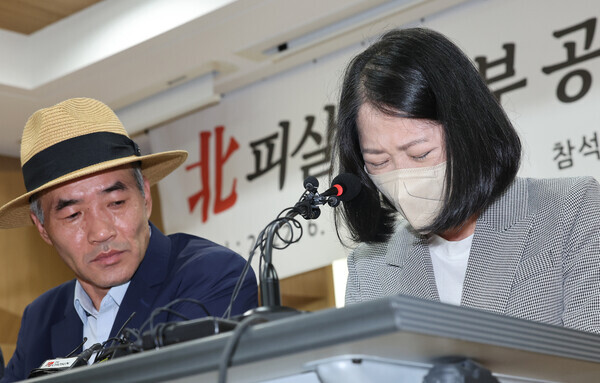hankyoreh
Links to other country sites 다른 나라 사이트 링크
[Editorial] Conflicts between new, old powers shouldn’t be used for political points

The conflict between the old and new political powers in South Korea is intensifying a little over a month into the term of President Yoon Suk-yeol, with the current administration taking direct aim at the previous administration by reversing the finding of the investigation concerning a civil servant who was killed by North Korea after going missing in the waters of the West Sea, hastening the investigation into allegations that the Ministry of Trade, Industry and Energy kept a blacklist, and pressuring heads of government organizations with remaining terms to resign.
Because these are all sensitive, volatile issues, the ruling and the opposition parties are clashing with great intensity. But triggering each other’s opposition doesn’t in any way help resolve the problems at hand or aid investigations into the truth.
The issue that’s being most heatedly discussed is the incident surrounding the slain civil servant who disappeared at sea in 2020. On Friday, the Board of Audit and Inspection began an audit of the circumstances that led the Coast Guard and the Ministry of National Defense to judge that there was reason to believe Lee Dae-jun, who was shot and killed by North Korea in September 2020, had voluntarily defected.
It’s undeniable that at the time, the obsessive focus on whether Lee had defected or went adrift at sea obfuscated the heart of the matter: the inhumane nature of North Korea’s action and the state’s responsibility to protect the right to life of its citizens. It’s definitely necessary to ascertain the truth of what happened and make public as much material as possible according to national security considerations and regulations.
But People Power Party floor leader Kweon Seong-dong’s remark that “everything is tolerated when North Korea does it,” and direct attacks against former President Moon Jae-in by the ruling party, are inappropriate. The ruling party is probably well aware that intelligence material concerning North Korea cannot be rashly made public.
The Democratic Party’s labeling of the ruling party’s attacks as “the new red scare,” as well as its stance that the livelihood of the public is more important than the ascertainment of truth, do not indicate that it has the attitude of a responsible political party either. The party should prioritize explaining to the public the grounds and circumstances that led to the judgment at the time.
The investigation into the Ministry of Trade’s alleged blacklist has now reached Democratic Party lawmaker Park Sang-hyuk, who previously served as an administrative official under the Blue House’s senior secretary for personnel affairs, after targeting former Trade Minister Paik Un-gyu, with investigators eyeing higher-ups of the former administration based on the possibility that the Blue House was directly involved in creating the supposed blacklist.
While investigations targeting the opposition party figures are progressing with break-neck speed so early in the current administration, there’s no indication that the investigation into the allegation that first lady Kim Keon-hee manipulated stock prices is going anywhere. In other words, the current administration is bringing the charge of unfairness onto itself.
The Yoon administration’s cold-shouldering of Jeon Hyun-heui and Han Sang-hyuk, the respective chairs of the Anti-Corruption and Civil Rights Commission and the Korea Communications Commissions, who were appointed to their posts during the Moon administration, by excluding them from Cabinet meetings and blatantly calling on them to resign despite the fact that as heads of independent government organizations, their terms are guaranteed, does not align with its emphasis on “legal process.” The Yoon administration should stop humiliating its opponents on matters the ruling and opposition parties should join forces to improve the system.
While the clash of the old and new powers may be of interest to those in political circles, the public may only feel heightened exhaustion and cynicism as they observe intensifying political conflict. Politicians should keep in mind that taking politically motivated stances on sensitive issues can result in backlash.
Please direct questions or comments to [english@hani.co.kr]

Editorial・opinion
![[Column] Season 2 of special prosecutor probe may be coming to Korea soon [Column] Season 2 of special prosecutor probe may be coming to Korea soon](https://flexible.img.hani.co.kr/flexible/normal/500/300/imgdb/original/2024/0426/3317141030699447.jpg) [Column] Season 2 of special prosecutor probe may be coming to Korea soon
[Column] Season 2 of special prosecutor probe may be coming to Korea soon![[Column] Park Geun-hye déjà vu in Yoon Suk-yeol [Column] Park Geun-hye déjà vu in Yoon Suk-yeol](https://flexible.img.hani.co.kr/flexible/normal/500/300/imgdb/original/2024/0424/651713945113788.jpg) [Column] Park Geun-hye déjà vu in Yoon Suk-yeol
[Column] Park Geun-hye déjà vu in Yoon Suk-yeol- [Editorial] New weight of N. Korea’s nuclear threats makes dialogue all the more urgent
- [Guest essay] The real reason Korea’s new right wants to dub Rhee a founding father
- [Column] ‘Choson’: Is it time we start referring to N. Korea in its own terms?
- [Editorial] Japan’s rewriting of history with Korea has gone too far
- [Column] The president’s questionable capacity for dialogue
- [Column] Are chaebol firms just pizza pies for families to divvy up as they please?
- [Column] Has Korea, too, crossed the Rubicon on China?
- [Correspondent’s column] In Japan’s alliance with US, echoes of its past alliances with UK
Most viewed articles
- 11 in 5 unwed Korean women want child-free life, study shows
- 2AI is catching up with humans at a ‘shocking’ rate
- 3[Editorial] Yoon cries wolf of political attacks amid criticism over Tokyo summit
- 4[Photo] “Comfort woman” survivor calls on president to fulfill promises
- 5“Japan’s No. 1 salesman”: Korean groups blast president’s treatment of forced laborers
- 6Yoon calls 60+ hour workweek “unreasonable,” orders revamp of policy
- 7[Editorial] Yoon’s white flag on historical disputes with Japan backfires immediately
- 8‘We must say no’: Seoul defense chief on Korean, USFK involvement in hypothetical Taiwan crisis
- 9[Special reportage- part I] Elderly prostitution at Jongmyo Park
- 10[Photo] More Sewol paintings by Hong Sung-dam